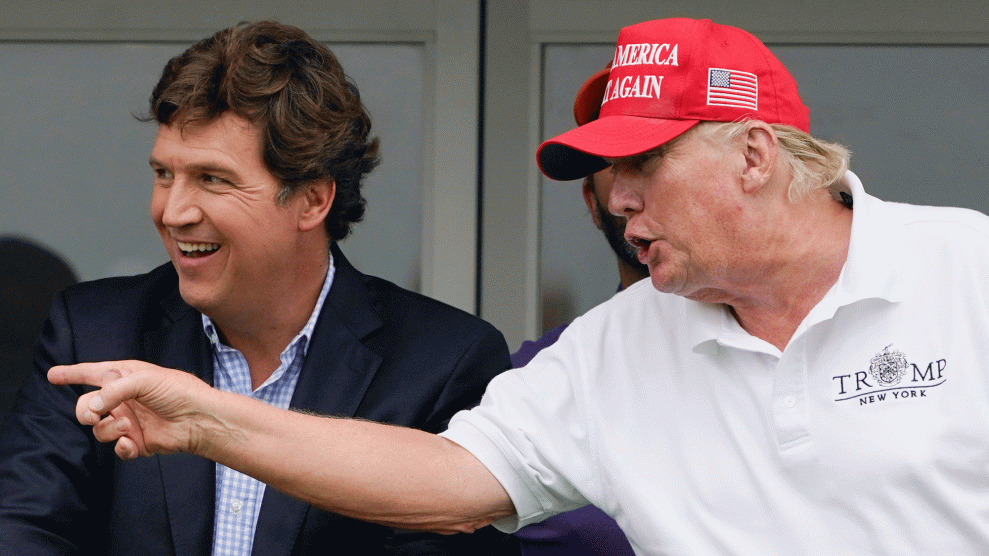
Tucker Carlson and Donald Trump chat at a golf tournament in July 2022.Seth Wenig/AP
Fox News luminaries will be taking the stand over the next six weeks, as Dominion Voting Systems’ landmark defamation case against the conservative media behemoth is set to go to trial on Monday. The jury will decide whether the network can be held liable for making groundless claims that Dominion’s voting machines rigged the 2020 election, as they weigh the limits of the First Amendment protections of the press in an era marked by disinformation. The witness list includes some of the most prominent names in conservative media, including Fox News owner Rupert Murdoch, CEO Suzanne Scott, and hosts Tucker Carlson, Sean Hannity, and Jeanine Pirro.
The case centers on the weeks following the 2020 election when Fox was the most prominent news outlet promoting the discredited conspiracy that the election was stolen from Donald Trump. Its hosts repeatedly broadcast baseless claims that Dominion’s voting technology had switched votes for Trump to votes for Biden, even as, court filings now show, they privately disparaged those claims. Dominion, which seeks $1.6 billion in damages, argues that Fox irreparably damaged Dominion’s reputation because the network was desperate to rescue its own ratings. Many loyal Fox viewers abandoned the network after it had accurately announced Joe Biden’s Election Night victory in Arizona.
Winning defamation cases requires meeting the high legal bar of “actual malice,” as defined in the 1964 Supreme Court precedent. Dominion must show that Fox News either knew that it was disseminating false information or acted with “reckless disregard” for the truth. Such cases are rarely decided by a jury: In 2017, three defamation cases went before a jury, according to research by Roger Williams School of Law professor David Logan that was cited in the New York Times. With Fox lawyers reportedly already preparing for an appeal, some legal experts see the case as an opportunity for the Supreme Court to revisit the “actual malice” standard, which conservative justices Neil Gorsuch and Clarence Thomas have argued is too high a legal bar.
Dominion’s copious evidence includes thousands of texts and emails showing that Fox’s hosts, producers, and executives amplified claims of election fraud even while knowing the claims were false. Take, for example, this exchange between hosts Tucker Carlson and Laura Ingraham about prominent election deniers Sidney Powell and Rudy Giuliani, who appeared on Fox dozens of times in the weeks following the election.
“Sidney Powell is lying by the way. I caught her. It’s insane,” Carlson wrote to Ingraham on November 18, 2020, according to the filing.
“Sidney is a complete nut,” Ingraham responded. “No one will work with her. Ditto with Rudy.”
“Our viewers are good people,” Carlson wrote, “and they believe it.”
In another exchange a few weeks after the election, Carlson texted hosts Hannity and Ingraham: “The whole thing seems insane to me, and Sidney Powell won’t release the evidence. Which I hate.”
In an email to Scott days after the election, Fox News owner Rupert Murdoch wrote, “Getting creamed by CNN! Guess our viewers don’t want to watch it. Hard enough for me!” A week later, he emailed Scott again: “Trump will concede eventually and we should concentrate on Georgia, helping any way we can. We don’t want to antagonize Trump further, but Giuliani taken with a large grain of salt. Everything at stake here.”
Lawyers for Fox argue that the claims championed by a sitting president were inherently newsworthy and that the First Amendment protects the outlet. “We err on the side of speech because the more and more speech you have, the better chance of having people actually getting the opportunity to point out what’s right and what’s wrong,” Fox attorney Erin Murphy told NPR last month. “We don’t suppress the speech that we don’t think is right.” In an email, a spokesperson for Fox called the lawsuit a “political crusade in search of a financial windfall.”
In a letter on Friday, Fox attorneys apologized to Delaware Superior Court Judge Eric Davis for misrepresenting Rupert Murdoch’s role in court filings. Fox lawyers have repeatedly insisted that Murdoch didn’t have an official title at Fox News, but last week, they disclosed that he was in fact an executive officer. The distinction may have limited which emails and texts Fox turned over during the discovery process. The judge has since launched an investigation into potential legal misconduct by Fox. At a hearing on Wednesday, a seething Davis told Fox lawyers, “I need people to tell me the truth—and, by the way, omission is a lie.”
Update, April 17: This article has been updated to include an emailed statement from a Fox spokesperson.
















